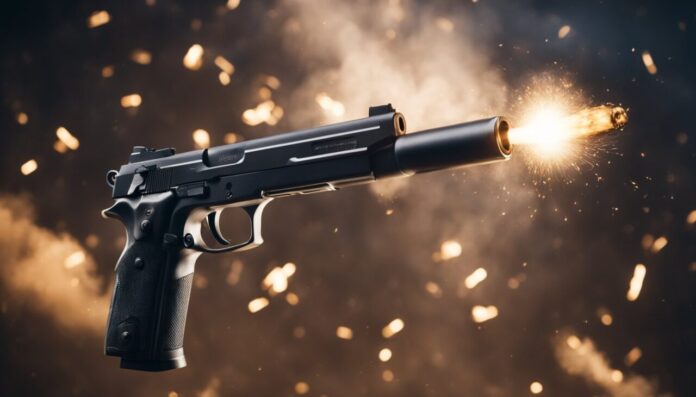
People like using pistols, rifles, and various other weapons.
In fact, there are over one billion firearms in the world, with over 85% owned by private individuals, 13% by the military, and around 2% owned by law enforcement agencies.
Yet, despite such a vast number of firearms, no one has attempted to shoot in space.
Okay, okay correction of slightly incorrect statement.
In fact, toward the end of the mission, the Soviet Union tested shooting from a cannon (Rikhter R-23) mounted on the ALMAZ/Salyut 3/OPS-2 space station.
And the shot was successfully executed.
So we must wonder – what would happen if you shot an ordinary pistol in space?
What would really happen?
Let’s see.
We’ll cover some basic physics, different effects to the bullet, and many other interesting characteristics of this experiment.
Key Takeaways – TL;DR
- No air means no sound: Without air molecules to carry sound waves, there’d be no “bang” from the gun.
- The Recoil: Force from firing the gun would be equal to the force of the bullet leaving the gun, potentially causing the shooter to spin or drift.
- Bullet keeps going: In the vacuum of space, a fired bullet would continue traveling indefinitely until it encounters an object or gravitational force.
- No muzzle flash: Without oxygen, there’s no combustion, so there’d be no visible muzzle flash when firing the gun.
- No bullet drop: In the absence of air resistance, bullets would travel in a straight line without any curvature due to gravity.
Basic Physics of Firing a Gun in Space
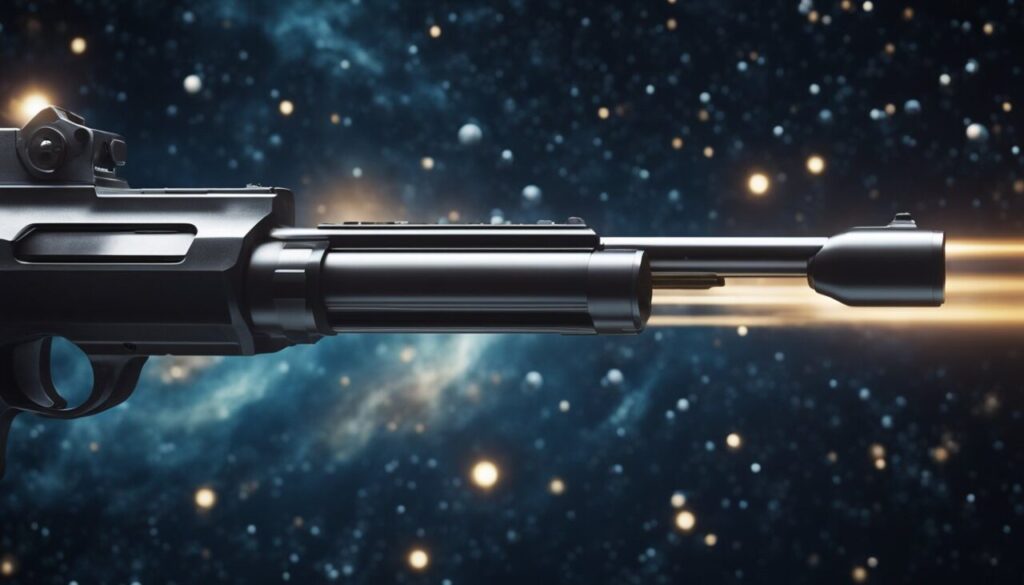
Lack of Atmospheric Resistance
One of the key differences between firing a gun in space and on Earth is the lack of atmospheric resistance.
On Earth, the air provides a certain amount of resistance to the bullet as it travels through the atmosphere. This resistance, known as drag, slows down the bullet and affects its trajectory.
In space, there is no air to provide this resistance. As a result, a bullet fired in space would continue on its trajectory at almost a constant speed, assuming it is not affected by any other forces.
Newton’s Third Law of Motion
Another important factor to consider when firing a gun in space is Newton’s Third Law of Motion, which states that for every action, there is an equal and opposite reaction.
In the case of firing a gun, the gunpowder ignites and creates a high-pressure explosion that propels the bullet forward.
At the same time, an equal and opposite force is exerted on the gun itself, pushing it backward.
On Earth, this recoil force is absorbed by the ground or the shooter’s body.
In space, however, there is no ground or other objects to absorb the recoil force.
As a result, firing a gun in space would cause the shooter to be pushed backward with the same amount of force as the bullet is propelled forward.
Interesting fact: In order to avoid being pushed backward, a shooter in space would need to use some kind of propulsion system to counteract the recoil force.
Would The Gun Even Fire Without Oxygen?

In space, there is no air or oxygen, which raises the question: would a gun even fire without oxygen to ignite the gunpowder?
The answer is yes, a gun would still fire in space, but not for the reasons you might think.
The gunpowder used in ammunition contains both fuel and oxidizer, meaning it contains its own supply of oxygen.
When the trigger is pulled, the firing pin strikes the primer, which ignites the gunpowder and creates a rapid expansion of hot gas. This gas creates pressure that propels the bullet out of the gun barrel.
Interesting huh?
Mathematical Calculations – Earth vs Space
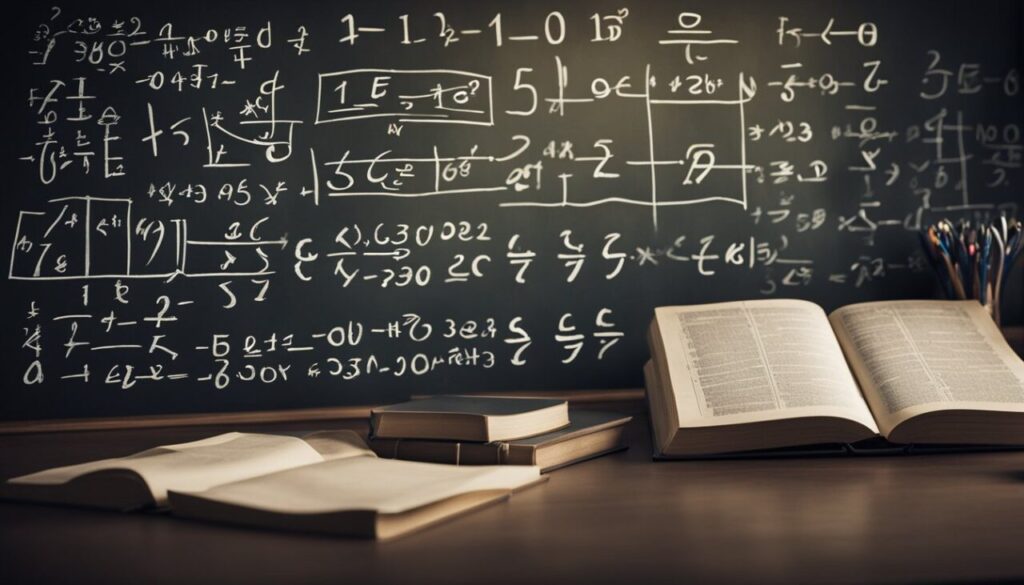
Speed on Earth and Falling to the Ground
We could say that the average bullet travels at a speed of 3000 kilometers per hour (1864 miles per hour).
Let’s also assume that the bullet is fired from a height of 1.5 meters (59 inches) and in a straight line.
Then the question remains – how far would the bullet travel before slowing down enough to fall on the ground?
Based on initial parameters we can calculate the time it takes for the bullet to hit the ground using the kinematic equation for vertical motion:
- Vertical distance = ½ × Acceleration due to gravity × Time2
Given:
- Initial vertical position (s0) = 1.5 meters
- Acceleration due to gravity (g) = 9.81 meters per second squared
The equation becomes:
- s= s0 + v0t +½at2
Where:
- s is the final position (0 meters, as it hits the ground)
- s0 is the initial vertical position (1.5 meters)
- v0 is the initial vertical velocity (0 meters per second, since it’s shot horizontally)
- a is the acceleration due to gravity (-9.81 meters per second squared, taking downward direction as negative)
We can rearrange this equation to solve for time (t):

Now, let’s calculate the horizontal distance traveled by the bullet during this time.
We’ll use the equation:
- Horizontal distance = Horizontal velocity × Time
- Given: Horizontal velocity = 822.96 meters per second
- Time = 0.553 secondsHorizontal distance = 822.96 m/s × 0.553
Horizontal distance ≈ 454.52 meters
So, the bullet would travel approximately 454.52 meters (0.282 miles) horizontally before hitting the ground.
Note: Of course, this would largely depend on weather conditions and type of bullet & rifle.
Okay, and what about in space?
Speed in Space?
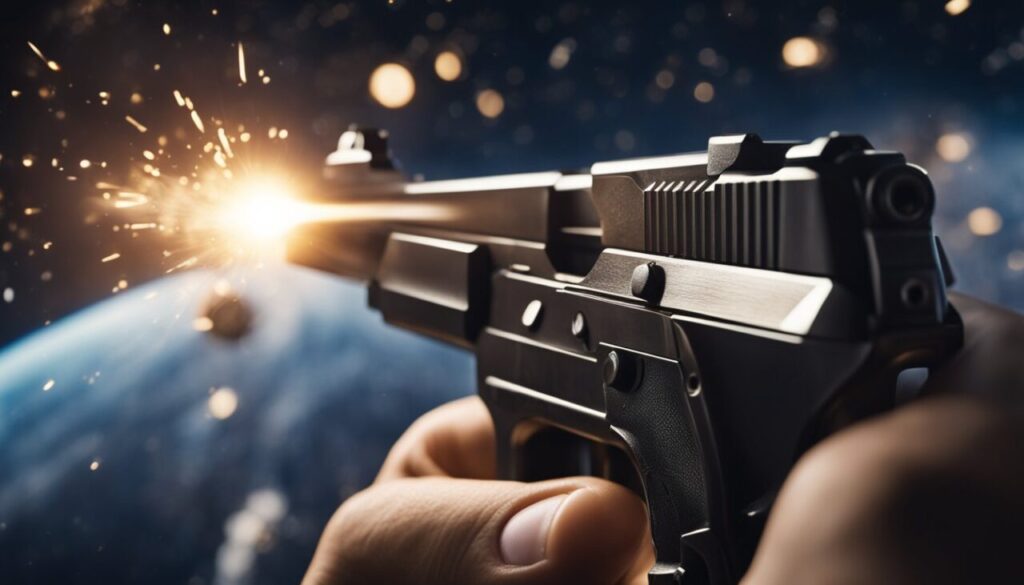
Let’s do some calculations.
Hm……
Well, actually there are no calculations to be done.
Namely, in space, where there is no atmosphere or gravity to obstruct its motion, the bullet would continue to travel indefinitely with its initial velocity and direction, assuming there are no external forces acting upon it to alter its trajectory.
So, in the absence of external forces, the bullet would travel on a straight path, maintaining its speed and direction indefinitely, without slowing down or falling to the ground (or anywhere else).
Interesting fact: In 1971, Apollo 15 astronaut David Scott conducted an experiment on the Moon where he dropped a feather and a hammer at the same time. Due to the Moon's lack of atmosphere and gravity, they fell at the same rate and hit the ground at the same time.
Long-Term Ride of the Bullet & Potential Collisions
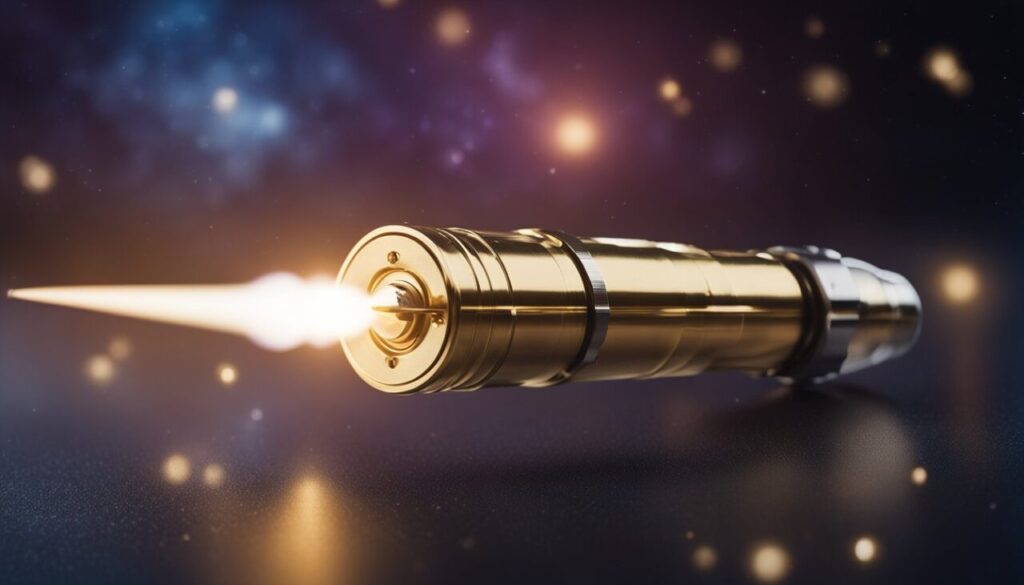
As mentioned when a bullet is fired in space, it will continue to travel in a straight line at a constant velocity until it is acted upon by another force. However, the bullet’s trajectory will be affected by the gravitational pull of nearby celestial objects.
As the bullet travels through space, it will encounter other objects such as asteroids, comets, and space debris.
These collisions would alter the bullet’s trajectory and cause it to change direction or break apart.
However, since the universe is mostly empty space, collisions would be unlikely.
Namely, only about 0.0000000000000000000042 percent of the universe contains any matter!
And at the end – there’s one other potential risk factor for the bullet flying indefinitely. Namely, the bullet’s surface would be bombarded by cosmic radiation, which could cause it to degrade over time.
Interesting fact: In 1971, astronaut Alan Shepard hit two golf balls on the moon's surface with a makeshift club. The balls are still on the moon and will remain there for many many years.
Conclusion

In conclusion, shooting a gun in space would result in some interesting outcomes due to the lack of atmosphere and gravity, but actually, nothing extraordinary would happen.
The bullet would continue to travel in a straight line at a constant velocity until it collided with another object or was affected by gravity. The firing of a gun also would not produce any sound.
Namely, in space, sound cannot travel because there is no medium for it to propagate through. Sound waves travel through the vibration of particles in a medium, such as air, water, or solids.
In the vacuum of space, there are very few particles, so there is no medium for sound to travel through. Therefore, this hypothetical gunfire in space would be a silent one.
Overall, while firing a gun in space sounds like an exciting thing to do, in reality, it would be a rather calm activity.
However, perhaps one day when space tourism becomes a reality, people may have the opportunity to fire a gun in space, with the bullet carrying a message.
As we’ve concluded, this bullet would most likely fly indefinitely, making it rather cool for something you’ve just fired to carry your unique message through space.




















